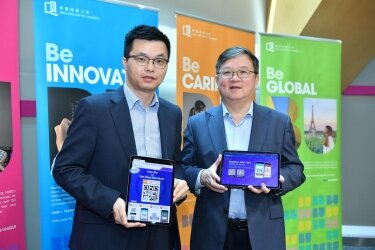
HKBU launches COVID-19 alert system

Researchers from Hong Kong Baptist University (HKBU) have developed a COVID-19 alert system which will send a message to users through a mobile app if they and an infected person have visited the same place within a time period that gives rise to risks of exposure. The system will not collect users' personal information and location data, thereby protecting individuals' privacy while alerting them on disease transmission risks associated with confirmed infection cases.
HKBU plans to launch a trial run of the system on campus in the new semester with the aim of enhancing COVID-19 risks alert capability inside campus venues and during teaching and learning activities. Staff and students can join the trial voluntarily.
Developed by a research team led by Professor Xu Jianliang, Associate Head and Professor of the Department of Computer Science at HKBU, the system has two anonymous modes of operation: venue-to-person tracing and person-to-person tracing. The system is easy to operate and users can simply use it by downloading the mobile application.
By taking a decentralised design approach, the system, which has been developed in four months, will not collect any personal information and location data. It is a safe and reliable system that uses the latest cryptographic technology to protect users' privacy. It also includes a mechanism that prevents users from falsely claiming that they are one of the contacts of a confirmed case.
Under the venue-to-person tracing mode, when users scan the QR code before entering the venue, the venue information and the time of visit will be saved onto their mobiles. If a user tests positive for the virus, he will receive a password to log on to the system, which will then broadcast the information, including the venues he has visited and the visiting times in the past 14 days, to all users' mobiles. The system will send an alert to the users through their mobile phones if they and the infected user have visited the same place at the same time period in the past two weeks. This will enable users to take appropriate action, including virus tests.
The person-to-person tracing mode is supported by Bluetooth Low Energy, a wireless communication technology. If two users stay within two meters of each other for a certain period of time, their mobile phones will exchange an anonymous code via Bluetooth and then save it in the respective phone's database. The anonymous code associated with each user's mobile phone will change regularly. If a user tests positive for the virus, the other users' mobile phones will receive the codes broadcast by the infected user's mobile phone over the past two weeks. By comparing the codes in the database of the mobile phone, the system can assess the risk for each user that came into contact with the infected person, and set off the alarm if necessary.
Users' privacy is well protected because all the information is stored on an individual's mobile phone. HKBU plans to launch a trial run of the venue-to-person tracing mode of the alert system on campus. The experience of launching the system, including the lessons learned throughout the technological development process and in terms of encouraging members of the University and visitors to use the system, will help the Government and relevant organisations combat the pandemic.
The system can effectively warn people who have been in contact with a confirmed case, but it does not collect personal information.
Professor Guo Yike
Vice-President (Research and Development)
Professor Guo Yike, Vice-President (Research and Development) of HKBU, said: "Promoting the integration of science and the humanities is a key research direction of HKBU. When the pandemic in Hong Kong was still in the early stages, we have been boosting various research projects related to the virus research projects and the development of this alert system is one of the results. The system can effectively warn people who have been in contact with a confirmed case, but it does not collect personal information. It strikes a balance between disease prevention and privacy protection.
"The global pandemic has not yet stopped. We hope to find out the mode of transmission of the virus in a timely manner to prevent it from spreading. We will make efforts to collaborate with the Government and the relevant departments with the aim of helping society by transferring the University's research and contributing to the fight against the pandemic in Hong Kong."
Previous News
Next News



